You searched for: 活期理财系统源码定制开发【TG���������@EK7676】平台包网搭建活期理财系统源码定制开发【TG���������@EK7676】平台包网搭建8k33AbIZvy
<< Previous | Displaying results 61-70 of 250 for "活期理财系统源码定制开发【TG���������@EK7676】平台包网搭建活期理财系统源码定制开发【TG���������@EK7676】平台包网搭建8k33AbIZvy" | Next >>
-
The "Final Solution"
SeriesThe Nazi “Final Solution to the Jewish Question” was the deliberate, planned mass murder of European Jews. Learn more about how the Nazis implemented the "Final Solution."
-
The Nazi Olympics Berlin 1936: African American Voices and "Jim Crow" America - Photos and Videos
Media Essay18 African Americans (16 men and 2 women) competed in the 1936 Olympic Games in Berlin. This was three times the number who had competed in the 1932 Los Angeles Games. The African American athletes on the 1936 US Olympic team brought home 14...

-
Fall of Warsaw
FilmGerman troops reached parts of Warsaw on September 8 and 9, 1939. During the German siege of Warsaw, the city sustained heavy damage from air attacks and artillery shelling. Warsaw surrendered on September 28. Here, German troops occupy Warsaw. This footage comes from "Tale of a City," a film made by a Polish underground film unit.
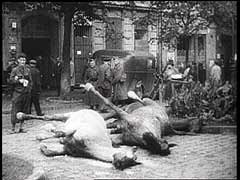
-
Sisters Eva and Liane Münzer
PhotoSisters Eva and Liane Münzer. They were placed in hiding with a devout Catholic couple. In 1944, Eva and Liane were reported to the police as a result of a fight between their rescuers. The husband denounced his wife and the two Jewish girls. The three were immediately arrested and sent to the Westerbork camp. On February 8, 1944, eight- and six-year-old Eva and Liane were deported to Auschwitz, where they were murdered. Photograph taken in The Hague, the Netherlands, 1940.

-
Auschwitz I camp, 1944
MapSelected Features 1. Camp Commandant's House 2. Main Guard House 3. Camp Administrative Office 4. Gestapo 5. Reception Building/Prisoner Registration 6. Kitchen 7. Gas Chamber and Crematorium 8. Storage Buildings and Workshops 9. Storage of Confiscated Belongings 10. Gravel Pit: Execution Site 11. Camp Orchestra Site 12. "Black Wall" Execution Site 13. Block 11: Punishment Bunker 14. Block 10: Medical Experiments 15. Gallows 16. Block Commander's Barracks 17. SS Hospital

-
Portrait of Aron's family on his mother's side
PhotoPortrait of Aron's family on his mother's side, taken when Aron's cousin moved to Israel in 1933-1934. Aron is seated second from left, bottom row. His mother, Miriam, is in the center row, second from right. Aron's father is behind her and to her right. Aron himself was 8 or 9 years old when this picture was taken in either May or June. At the time, Aron recalled, "I was thinking about going to summer camp." Slonim, Poland, 1933-1934.
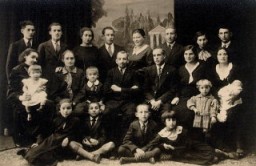
-
Third Reich: An Overview
ArticleThe Third Reich began with the Nazi rise to power in 1933 and ended with the German surrender in 1945. Learn more about Nazi Germany during World War II.
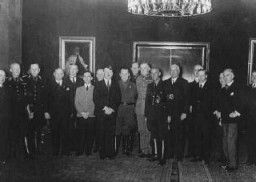
-
Norway
ArticleGermany invaded Norway on April 9, 1940. Read more about this invasion, the collaborator Vidkun Quisling, and the tragic fate of Norway’s Jews.
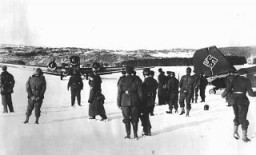
-
Sephardi Jews during the Holocaust
ArticleLearn about the fate of Sephardi Jewish communities during the Holocaust. On the eve of WWII, Europe's Sephardi Jews lived mostly in the Balkan countries.
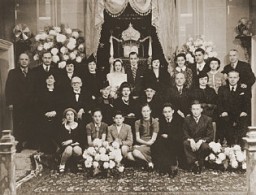
-
Subsequent Nuremberg Proceedings, Case #6, The IG Farben Case
ArticleThe IG Farben Case was Case #6 of 12 Subsequent Nuremberg Proceedings against leading German industrialists, military figures, SS perpetrators, and others.

